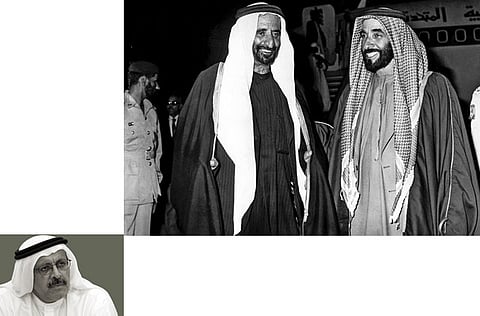Enhancing nation's unity
The continuation of the federal Union is a result of a clear vision and sharing of roles and responsibilities by all the emirates

It has been 40 years since the creation of the UAE federation. It was a difficult beginning, yet the UAE will today observe its 40th anniversary. Building the country’s infrastructure needed enormous efforts, in order to meet modern standards and demands.
The social, economic and political solidarity between the UAE people and the leadership was an important factor in the country’s building and development process. Regrettably, the overall backwardness in the country was a result of the British policy of divide and rule, as well as the iniquitous treaties which also led to a lack of communication with Arab, Islamic and other countries across the globe.
The people of the UAE realised the importance of education, and the various programmes on the Voice of Arabs — the official Egyptian radio station — were very popular.
Other bright points which made us hopeful about our country were the liberation movements that were taking place across the Arab world, especially in Yemen.
Usually, communities create establishments that contribute to cultural interaction. The community’s elite find the appropriate mechanisms to achieve their dreams and aspirations.
Hence, schools during the 1950s played an educational and cultural role, while reflecting the spirit of patriotism and devotion despite all hurdles. One question springs to mind here about the cultural situation in the country before the federation’s birth: how did people obtain reading, audio and later visual material?
Teachers had a prominent and important status in the community. Everyone respected them, which is not strange as Arabs give a lot of importance to teachers and mentors.
The nationalities of the first teachers and educationists in the UAE varied. They came from Egypt, Syria, Palestine and Iraq. As a result, their ideological orientations were diverse. Their common denominator was that they taught young Emirati men and women.
A teacher held his vocation in great esteem, as he was erasing illiteracy from the community and fighting darkness with the enlightenment that education and literacy brought about.
Many Emiratis travelled to Gulf, Arab and other countries to continue their education in universities. So it comes as no surprise that Dr Salem Al Mahmoud graduated from the former Soviet Union, Ahmad Al Suwaidi from Qatar and then Cairo, and many others from the Levant.
Those who left the country for the sake of education were the same people the newly formed federal state depended on. Those people occupied leading positions in the union and laid its foundations, while taking into consideration their Arab and Islamic environment.
The country’s leadership represented by Their Highnesses the Rulers of the emirates counted on the loyal and dedicated citizens, despite the educated elite’s diverse political and social outlook and backgrounds.
Both Shaikh Zayed Bin Sultan Al Nahyan and Shaikh Rashid Bin Saeed Al Maktoum, and their brothers, Members of the UAE’s Supreme Council, played an important role in providing all that was necessary to make the mission of the educated Emirati nationals a success.
Hessa Al Osaili was able to introduce the UAE to the world through international exhibitions, as did other talented and highly-educated Emirati women.
The UAE was and still is part of the non-aligned countries and an active member of international bodies, such as the UN. The UAE also believes in diplomatic solutions in settling disputes and solving its problems with its neighbours. A great example of this is the diplomatic approach the country has embraced with regard to its three occupied islands, the Greater and Lesser Tunbs and Abu Mousa.
The 1970s and 1980s were eventful decades for the UAE. Not surprisingly, the press and television stations enjoyed a high level of freedom.
But freedom always comes with responsibility and the sons and daughters of the UAE were well aware of their role in laying down the foundations of state institutions, maintaining stability and the unity of the federation.
From the very beginning of the federation, the concept of distributing and sharing responsibilities was put into place, whereupon Abu Dhabi had taken the responsibility of handling political issues and foreign relations, while Dubai assumed and carried out all forms of business activities.
Dubai has continued its role in this field since the 1930s. It is no doubt a hub of trade and commerce.
On the other hand, Sharjah concentrated on the cultural field. The rest of the UAE’s emirates also collaborate with the first three in many fields. Both Fujairah and Ras Al Khaimah represent the country’s strategic ports in the event of any unforeseen instability in the region. The continuation of the federal Union is a result of a clear vision and sharing of roles and responsibilities.
A recent seminar in Beirut at the Centre for Arab Unity Studies discussed the UAE’s model and experience, where the positive points were highlighted and solutions were suggested. The seminar reflected people’s affection and devotion to the UAE and its political leadership.
Enhancing the UAE’s unity will be the mission for the coming 40 years.
Dr Mohammad Abdullah Al Mutawa is a professor of sociology.
Sign up for the Daily Briefing
Get the latest news and updates straight to your inbox


